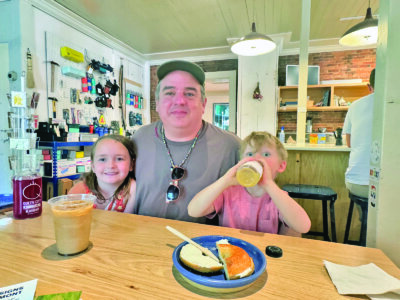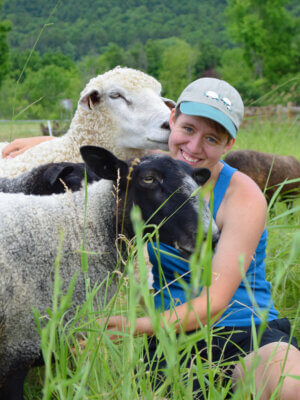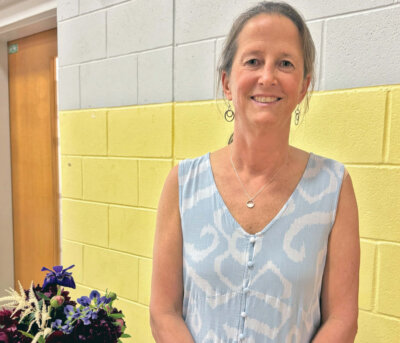Lucy Weaver helps humans and dogs understand one another
It turns out, city dogs and country dogs aren’t that different.
Lucy Weaver grew up in Charlotte but relocated to New York City where she started working with dogs. Moving back home, she founded her business Dog Speak in 2017 and discovered that the issues facing her canine and human clients had a lot in common with those she had dealt with in the city.
Weaver always knew she wanted to work with animals. She went to graduate school to study animal behavior and her work included research projects with leatherback turtles and whales. For her master’s thesis, she studied miniature donkeys at the National Zoo in Washington, D.C., analyzing the choices they made on whether or not to interact with humans.

Lucy Weaver with Lila and Henry Weaver-Masseau and Willow and Mabel.
While living in New York, Weaver worked at a doggie day care and then secured an apprenticeship with Andrea Arden, a dog trainer who has been featured on television shows ranging from the Late Show with Stephen Colbert to the Today Show and Animal Planet. Returning to Charlotte with her husband, she found conditions perfect for her new business.
“When I moved back here it suddenly seemed like everyone had gotten a dog,” Weaver said. “There were so many more than when I was growing up.”
Weaver is fascinated by the connection between humans and animals and notes that she works with people as much as she does with dogs. Although she is not currently taking private clients, she said that she found it humbling when people invited her into their homes to help them with their dogs’ behavioral challenges. Weaver noted that these challenges can affect the entire family and often the dog owner has a lessened sense of self-worth because they believe they are failing their pets.
Weaver and her husband adopted their dogs Willow and Mabel before their first child Henry was born. Weaver took an on-line course through an organization called Family Paws to learn how to help the dogs adjust to the new baby. She is now a certified Family Paws instructor, one of only two in the state, and she offers a workshop every other month for those who want to make sure their babies and young children can exist safely with dogs.
Weaver said her training work isn’t that different from what she provided in New York, She helps owners potty train their dogs and instill good healthy manners. A big part of her job involves leash reactivity — dogs that bark or lunge when they are on the leash.
“More and more people are taking their dogs more and more places,” she said, “and they expect them to be members of polite society.”
Weaver said dogs rely heavily on body language which is impeded by leashes and harnesses. Owners have to realize that their goal of walking with the dog may not be the same as the dog’s goal of stopping and sniffing. If those dogs have lived in close quarters all their lives, they also may not have sufficient experience in socialization with other dogs on those walks.
For Weaver, it all comes down to the fact that humans are asking dogs to fit into our human world.
“I tell people that dogs are just toddlers with fur and teeth,” she said. “They wear their hearts on their sleeves and their behavior comes from their emotional state.”
She said that when a dog jumps on the counter to get something they shouldn’t, it’s not because they are stubborn and want to be dominant but because they do what they think they need to do.
Weaver appreciates that dog rescuers are bringing dogs to the Northeast from the South and the islands but said this has created unintended consequences. The most adoptable dogs come north while those with behavioral issues are left for communities which may not have the resources to help them succeed. Rather than spend money bringing dogs north, she would like to see money donated to poorer communities so they can keep their dogs rather than put them up for adoption.
“People who love dogs really want to do the right thing,” Weaver said.
She describes herself as a positive reinforcement trainer but added that it is important to understand the mindset of her human clients and not judge them if they use tools like prong collars or e-collars that she doesn’t agree with.
“My real goal is to help people understand how to listen to their dogs,” she said. “I really strive to educate people and possibly get them to adjust their expectations.”
Related Stories
Popular Stories
If you enjoy The Charlotte News, please consider making a donation. Your gift will help us produce more stories like this. The majority of our budget comes from charitable contributions. Your gift helps sustain The Charlotte News, keeping it a free service for everyone in town. Thank you.
Andrew Zehner, Board Chair









